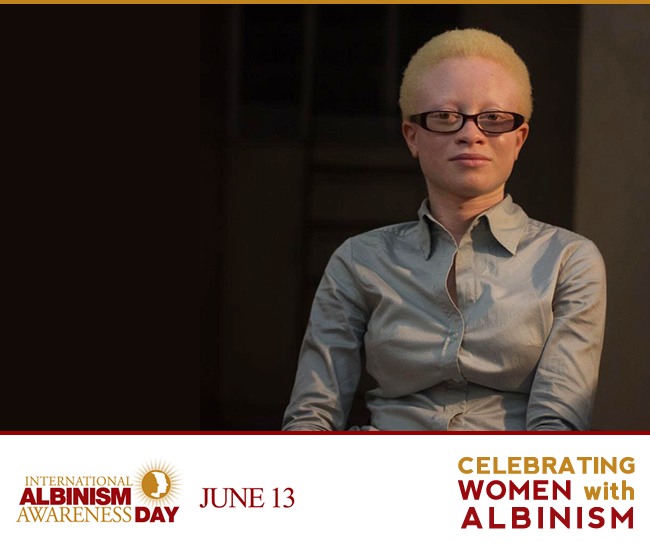Advocacy and Human Rights Officer at Under the Same Sun; Albinism Activist

I was born in Mwanza, a region bordering Lake Victoria in Malawi.The name-calling I experienced from people around me, as I walked to school made me start to wonder about my condition.I have never experienced problems with my family, because both my siblings also have albinism though our parents don’t. In fact, my mom always made sure that we wore protective clothing and stayed out of the sun, while my dad always bought us books, so we had a habit of reading a lot, which was extremely helpful especially in primary school where our visual impairment was a great challenge.
I hated the fact that I would go into class and find notes or test questions on the blackboard, I couldn’t see a thing. Sometimes no one wanted to read for me, some of my classmates teased me each time I tilted my head trying to read what was written on the board. I hated it when I had to pretend to write and when the teacher collected our exercise books for marking mine was empty. I hated Math, because teaching was done on the blackboard where I could not read. I hated my walks to school and back home because I would get teased all the way.I was a loner and I hated school altogether. Primary school to be precise, but weird enough, in mid-term and annual exams (which were printed on paper) I always came first, second or third of my class.
As I grew into my teens, I became more insecure with myself, I remember, each time I made a new friend, I would say to them, “you know I have lots of spots on my skin eey” in a way to see whether they’ll still be friends with me or not. However, as I grew older, I that gradually went away, and when I began volunteering at Under The Same Sun, an NGO advocating for rights of people with albinism, things changed completely. For the first time I understood what albinism was, and I met people like me who faced what I have but succeeded anyway, I met people like me who encountered terrifying experiences that made me thankful and appreciative of the good that I was blessed with. I graduated university with a law degree and am now an employee of this NGO. I have learnt to accept and love myself. Better yet, I am full of confidence and morale to reach my full potential to achieve greater goals. I’m in no way ashamed of myself, and I no longer feel obliged to justify my flaws to anyone. To make it simple, my albinism no longer hurts my feelings.I am a mom, an LL.B graduate and currently managing an albinism awareness project and lobbyingthe government for policy and legislative forms. I was blessed with supportive parents, and I was lucky to get supportive friends in university.
I aspire to become an influential international human rights activist able to do even greater in advocating for rights and welfare people with albinism. I wish women with albinism in Africa learn to love and accept themselves and be confident enough to show their full potential. I wish we get more graduates, leaders and other professionals who are women with albinism.
Young girl, it’s ok to have albinism. Don’t be ashamed of your condition. You are beautiful and unique. You don’t need to fit in! Do not conform yourself to the standards of those who belittle you. Cancer kills, wear sun protective clothing. Don’t be a slave of “how will people see me?”. Whether you are a student, farmer, street vendor, working in an office somewhere, give it your best, aim higher. You are capable of succeeding.

